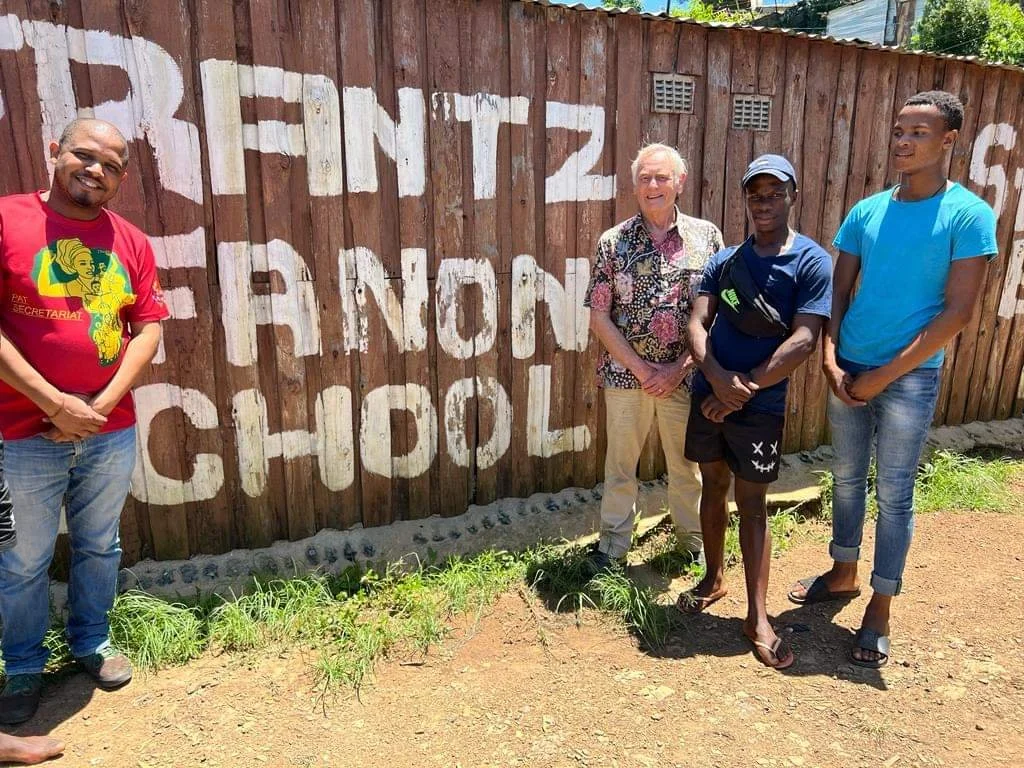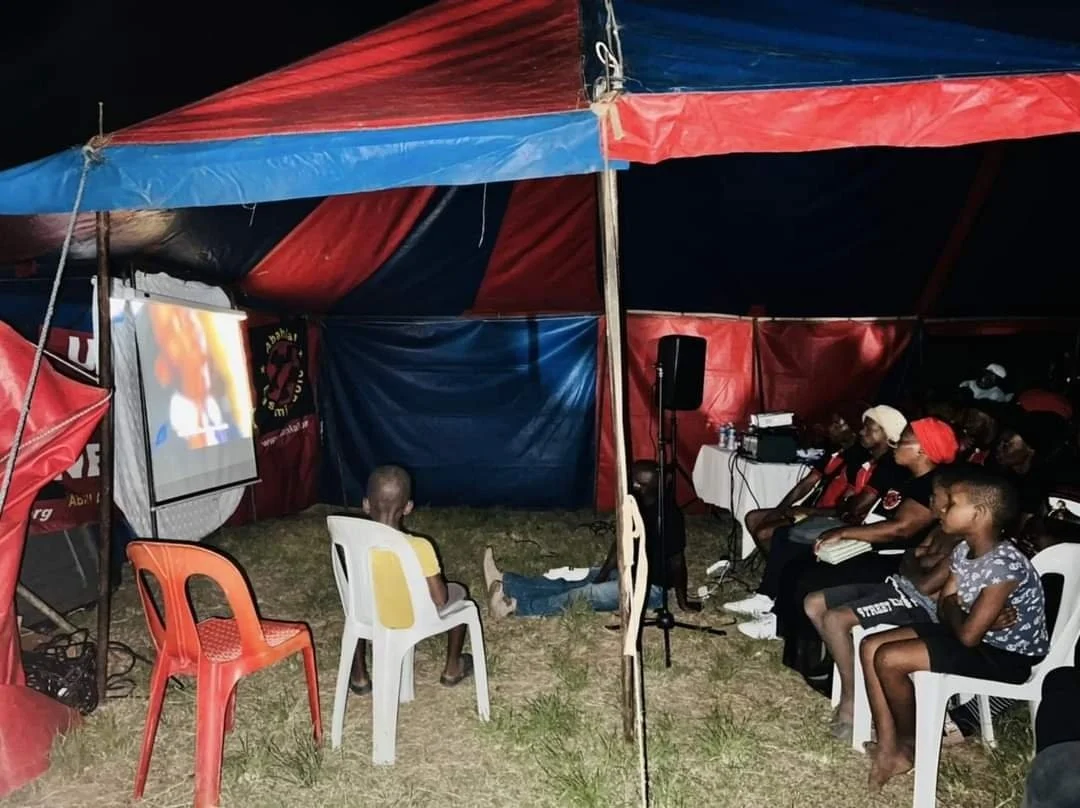Ubuhlalism: How the South African land rights movement is empowering youth through Political School
Picture By Rogan Ward
Written by Naledi Sikhakhane
Tuesday, 21st March was Human Rights Day, recognizing a turning point in South Africa where the oppressed stood up and fought for equality. The date marks the anniversary of the Sharpeville Massacre, when police fired on a peaceful crowd that gathered in protest against apartheid-era Pass laws, killing 69 people and wounding 180.
Apathy and voter fatigue are rife amongst the South African youth: A quick vox pop in the streets will let you know, young adults don’t really know why the day is commemorated and have minimal interest in the political and social issues that affect South Africa. This is partly due to the lack of political education and the isolating culture of urbanization.
Phumelele Mkhize – part of the leadership in Abahlali BaseMjondolo’s iKhenana commune – is working to address this issue. The informal shack settlement is an anomaly compared to other shack settlements as they have mastered the art of unity.
There are businesses such as a chicken farm and community gardens that the community uses to make an income and fight off hunger in the community. There is also the Frantz Fanon Political School which Mkhize credits for keeping the community inspired despite repression.
The school is a project of the eKhenana Commune, an Abahlali baseMjondolo land occupation in Durban. It is used by the movements’ branches around the country and has hosted students and teachers from across South Africa, elsewhere in Africa, and from movements in other parts of the world such as Latin America, the Caribbean, and Europe.
The comrades in eKhenana have developed particularly close relationships with Pudemo, the movement for democracy in Swaziland, and the MST in Brazil. Ruthie Wilson Gilmore and Craig Gilmore also recently visited The Frantz Fanon School.
Struggle veteran David Hemson visited the eKhenana Commune earlier this year. He is one of many activists who often come to share knowledge and listen to the community.
“We are in the struggle to build leaders, everybody’s idea is valuable. We do this four days a week, for two to three hours, in two different classes: One for children of 13 years and younger people who attend on the weekend when they are not in school. [Those] 14 years and older attend during the week,” said Mkhize
This school is reminiscent of what used to be a widespread culture in South Africa, political theaters, events, newspapers directed at the youth, television programs, and many other programs that shaped young minds' worldviews now all of that has been left up to traditional schooling. The results have manifested in many ways, one of which is that there has been a sharp decline in voter turnout since the 1994 national election. The 1994 election saw a voter turnout of 86,87%, whereas the last National and Provincial Election – in 2019 – saw 66,1% of registered voters turn up at the ballot box. The most recent LGE in 2021 produced a meager 45,86% voter turnout.
People aged between 18-20 have the lowest voter turnout of all the age groups in the country. A report commissioned by the Konrad Adenauer Stiftung on voter turnout in the 2021 LGE, shows that less than 20% of the population aged between 18-35 registered to vote. This lowers the quality of South Africa’s democracy, it can only truly be robust if all citizens are participating and feel seen.
The commune is one of the first where Ubuhlalism, which is an Afrocentric take on socialism has fully been in practice for a few years. The movement has over 100,000 members nationwide where other shack dweller communities join and begin to live with a socialist approach of one for all, share resources, try to create their food systems, and help the vulnerable in communities.
For example, Gender Based Violence is shunned in Abahlali communes and great lengths are taken to protect migrants even during some of the violent xenophobic incidents, migrants in those communities were safe.
“We feel the Political school is important because a cadre who doesn’t align with an ideology or understands the political world is a potential enemy of the movement,” said Mkhize. “It's important because it grooms the future leaders of our struggle, which is a second layer of leadership in the movement. We have the national leadership, but the branches are led by the youth.”
“We need well-politically trained cadres who understand what we are fighting for: we are against capitalism, so one needs to understand the advantages and disadvantages of the capitalist system compared to socialism, which we are practicing here in the branch. We need to understand what is expected of us and this school unifies us, every day we discuss the issues that surround the idea we are working towards, the mission, and the vision so we all live and work towards our vision to build a just and equal society based on respect and dignity. We can’t achieve that without being literate. The only way we can beat the system is through extensive research and enriching ourselves with the knowledge to free our children’s minds. They must know that the world is their oyster, despite their current circumstances living in the shacks,” said Mkhize.
Mkhize says the classes have slowed down because so much of the shack dweller movement’s leadership has had to be in court regularly to get justice for their slain heroes, help fight for new branches that regularly get kicked off the land, and resist repression from the government which regularly detains members on trumped-up charges. The iKhenana commune has especially been faced with gruesome executions of their leaders, in the past two years.
At large, the South African youth faces a plethora of socio-economic challenges such as record-high unemployment, hunger, and a lackluster education system. Youth in peri-urban areas with working-class, informally employed, and unemployed parents have very little in the form of extracurricular activities, self-development, and political education. One would think with the internet, all information is readily available but once again economic factors create a gap, there is a huge digital gap in South Africa and data prices are high thereby locking people out of accessing information and online resources.
At a Social Justice Assembly in Johannesburg, Pumla Mngesi echoed sentiments that I have come across in all social justice spaces: We have left the kids behind.
South Africa by nature used to be very education based, targeting the youth. That's how the youth of 1976 knew that the system was unjust, they knew they had the power to make a change and marched against Bantu education and the apartheid system.
ALSO BY NALEDI
Racism in Former Model C Schools: Apartheid’s legacy lives on
Pumla Mngesi used to attend community meetings at the age of 14. By 16 she was a freedom fighter detained by the apartheid police. She has been a rights defender ever since.
“We need to go back to those community dialogues, the kids now don’t know what is going on, we need to get back that each-one-teach-one attitude, that’s the only way we can make a change,” says Mngesi.
Political reporter Samkelo Maseko says that even in the media there isn’t a concerted effort for civic education anymore. “We need to think about how we are going to get this generation to be aware of their rights, the funding that used to go towards civic education has dried up. We need to utilize community media and the South African Broadcast Corporation as tools to enlighten, build and unite,” says Maseko.
To drive his point home he gave a little anecdote about the day he was in a police station and there was a passed-out guy on a bench who could’ve been in his early fifties, a policeman came and instructed him to get on his feet and head to the cell as they had processed his arrest. Maseko says the man insisted that he be read his rights before going into the holding cell. “He shouted ‘I know my rights, you need to read me my rights, you can’t just take me in!” Maseko says, as annoyed as the policeman was he complied and led him to the cell.
A younger person might not insist because, well, they don’t know and the injustices may feel abstract. But for the older generation, because they or their parents fought so hard for these liberties, they don’t take exercising their rights for granted.
It was a daily conversation that encompassed so much – a sense of self, a certain worldview – and as cliché as it sounds one does need to know where they came from to know where they are going and the youth have been left to their own devices, hopeless, angry and they have forgotten that these systems can change, they are not set in stone.
We don’t have to depend on supermarkets for food, we can create our own systems, we don’t have to depend on the set school curriculum we can acquire more knowledge, we don’t all have to be employees, we can be entrepreneurs, we don’t have stick to the current party voting system, we can have independent candidates, that we can hold accountable more as they will come from our communities and be answerable to us.
Lastly, we don’t have to tolerate corruption and incompetence from the ruling party, we can select new leadership. There is a sense of exhaustion, citizens have resigned themselves to the status quo, but the more community-based initiatives that focus on the youth, the better.
The Frantz Fanon school is especially significant because the socio-economic state puts children coming from shacks 10 to 20 steps behind in life. Shack settlements often lack electricity, running water, and other necessities. This can result in falling into the trap of having to work for survival which leaves little time to reach for the sky to dream of being a president, a mathematician, or a business mogul.
Naledi Sikhakhane (she/her) is a journalist and writer who aims to bring about social justice in her work. She covers migration, women, the working class and other groups that need platforms to be heard and seen. Her work is on New Frame & MeetingofMinds UK.






